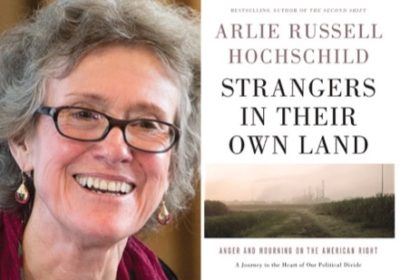Q&A: ARLIE HOCHSCHILD, Strangers in Their Own Land: Anger & Mourning on the American Right. What new story can make Americans yearn for the future more than the past?
Written on April 13th, 2018Free Forum: A World That Just Might Work – 03-13-2018
Terrence McNally interviews Arlie Hochschild, sociology professor emerita, UC Berkeley, author, Strangers in Their Own Land
McNally:
Okay. Hello, I’m Terrence McNally and welcome to Free Forum: A World That Just Might Work.
Soon after the 2016 election, I discovered this quote from Antoine de Saint-Exupery, who’s most famous for writing The Little Prince. Here’s the quote. “If you want to build a ship, don’t drum up the men to gather wood, divide the work and give orders. Instead, teach them to yearn for the vast and endless sea.”
My question is, how do we do that in 2018? That day, a bit over a year ago, I wrote the following: “Passion to return to a simpler past drove enough voters to the polls in swing states to decide the 2016 presidential election. How can we engage their emotions in a more positive forward-looking or progressive direction? When you offer people the preservation of the present, or the return to the past, when you offer to postpone or eliminate change, as Trump does, your audience has an experience to draw from. And for many, an inflated or idealized vision of the past has a clear advantage over the yet-to-be-experienced future, the uncertainty of that future.
Can we generate a vision of a future that is as welcome, compelling, inviting and real as the past some so fondly remember? Let’s start with the following questions. What is a compelling narrative that can drive Americans to yearn for a future richer than the past they want to come back? What vision could we offer to engage their emotions, because clearly, emotions are at play here, that will fuel their yearning rather than feed their fear? And who can do this, and who should do this, and who is doing this?”
Ever since that day, I’ve been wanting to talk with today’s guest, Arlie Hochschild, professor emerita of sociology at UC Berkeley, and author most recently of Strangers in Their Own Land: Anger and Mourning on the American Right.
For over 30 years, her inventive and provocative and useful insights about contemporary work and family have grown out of research. She’s done the interviews, she’s spent time with the people, and she has long focused on the human emotions which underlie our moral beliefs, practices and social lives.
Known as the founder of the sociology of emotion, she’s the author of several books including Second Shift, The Time Bind and The Outsourced Self. At the core of her most recent book, Strangers in Their Own Land, is the power of a story. After five years talking with folks in southern Louisiana, Hochschild sensed that a particular deep story they share is what holds their political contradictions together. I want to hear more about the power of that narrative and ask what she thinks is possible in terms of coming up with another narrative, a narrative that offers an inviting and inclusive future. I imagine she will say, “Start by listening.”
Welcome, Arlie Hochschild. You laughed and said that, in fact, that would be your first advice, wouldn’t it?
Hochschild:
I think it would, I think it would. And to not be frightened to sit down and respectfully listen to people that you know going in are going to be different from you in their outlook, their premises.
But, to pick up the challenge you just posed… After you’ve listened, what kind of a vision could one put forward. The people I came to know in researching Strangers in Their Own Land over five years in the center of the petrochemical industry in Louisiana, very right wing, everybody went for Trump, I got the feeling that they would be very interested in a vision which, for one thing, is unifying.
Link to the podcast interview
Continue reading “Q&A: ARLIE HOCHSCHILD, Strangers in Their Own Land: Anger & Mourning on the American Right. What new story can make Americans yearn for the future more than the past?”

